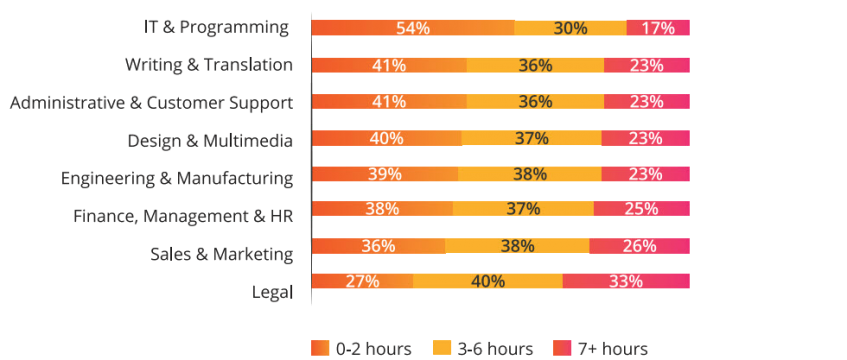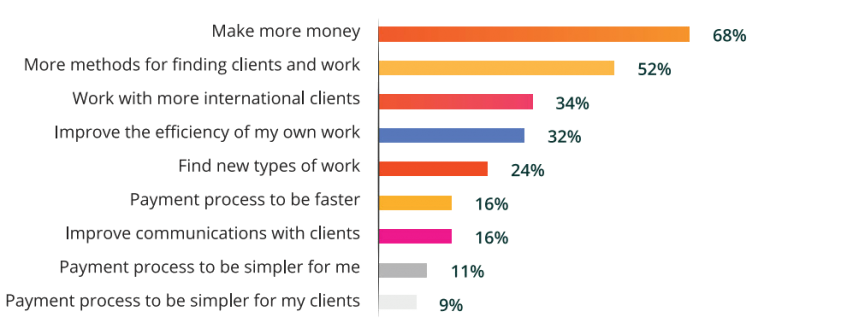
How Much Time Should Freelancers Spend Finding Work?
A significant amount of a freelancer’s time is spent looking for new projects. That is part of the nature of the business. Because work tends to be short-term (and no client is guaranteed to continue the relationship forever), freelancers need to be assured that their pipelines are always full.
If you are a freelancer, though, you may wonder exactly how much time you should spend on finding your next project.
It depends on the industry you are in…
While the exact time spent looking for work will vary from freelancer to freelancer, it also differs, depending on the industry in which you work. For example, 33% of freelancers in the legal field spend 7+ hours a week looking for gigs, while only 17% of IT and programming freelancers put in that much effort. Why? It may be easier for the latter to secure long-term clients, while legal freelancers may work on one-off projects and constantly need to find more work.


Download the Freelancer Income Report
The sweet spot across all freelancing industries, however, seems to be spending three to six hours a week looking for work on online marketplaces, through word of mouth, and via social media.
It also depends on how much you freelance…
If you are a full-time freelancer, naturally you will have more time to both do the work as well as look for it. However, if you moonlight at nights and on weekends, you will have less time for both activities. Keep the amount of time you spend looking for work in proportion to the total amount of time you have available for freelancing.
And depends on how new you are
New freelancers will need to spend a greater portion of time drumming up business than seasoned pros. As you build your business, you will also build a reputation for yourself, and you will not only secure repeat business but also get referrals from your satisfied customers.
If you are new, do not be surprised if you need to spend 75% of your time finding new projects. The key is to try different ways to attract new clients, then zero in on the ones that get you the best results.
You might be surprised how much work goes into selling yourself
When finding new business, you are probably thinking about bidding on a specific project with pricing and scope, but there is actually much more involved.
Finding work also includes marketing yourself. You might write blog posts on your website to show off your expertise, or update your social media profiles to expand your network. You might attend industry events to gain more proficiency at your craft as well as meet potential clients and partners. You might advertise, or attend local networking events.
All of these tasks contribute to attracting new business, so do not discount the importance of focusing on each of them.
Bottom line? Always be looking
Here is a secret. Many freelancers fail because when work comes in, they do not look for more. The problem is, when those projects wrap up, these freelancers are left with nothing to do.
The economy, too, is something to consider. When times are good, business rolls in, but when there is a recession or otherwise uncertain financial times, work tends to evaporate.
Clients end projects, either due to budget constraints or the end of their need for your skills.
All of these are reason enough to constantly work to find new clients. Subscribe to job board listings and every single day review them, even if you are swamped with work. Some projects might take months to respond, so you might end up with a well-timed project months out simply because you took the time to apply. Sometimes a potential client does not initially choose you, but then comes back and hires you after another freelancer failed them.
Always be looking.
Tips for maximizing the time you spend
Sixty-eight percent of freelancers are constantly looking to make more money. They are seeking more ways to find clients and work. If you come up with a good process to find new work, it will get easier to do so over time.

Download the Freelancer Income Report
Find a system that makes it easy to stay on top of new projects as they are posted, such as setting up email notifications for an online freelance site. Carve out time every day to review and bid on projects. The sooner you bid, the more likely you are to be considered since clients receive a flood of applications and usually do not review all of them if there is a qualified candidate or two in the initial responses.
Do not overlook your existing and past clients. A short email checking in on them can net you more work, and it takes seconds. Asking for referrals from clients who love you can also help you find new business with little effort.
It can be helpful to designate one day a week for your administrative and marketing tasks. This is the day you do not work on client projects but instead write your marketing content, update social media, and find other ways to differentiate yourself as a freelancer.
The best way not to need to constantly look for new work is to deliver great results to your existing customers. Make their happiness your top priority; meet or beat deadlines and always review your work to ensure that it is flawless. Happy customers are ones that will work with you for years.
If it is possible to pitch clients on recurring work, you can also stabilize your income. For example, if you are a freelance writer, you can pitch a client on writing a fixed number of blog posts each month for better results. As a web designer, you could create a maintenance package that gives a client your skills and updates for their website for a retainer fee. Be on the lookout for ways to upsell your clients so that you can continue to deliver value.
While freelancing does not guarantee a steady income the way being an employee does, it does give you the freedom to pick and choose the kinds of projects on which you want to work. As you zero-in on your ideal customer, pay rate, and type of project, you can start focusing on attracting more of those types of clients. Still, it is important to never get too comfortable and to constantly keep your eye out for new opportunities.
Working on Upwork, Fiverr or PeoplePerHour? Get paid with Payoneer




